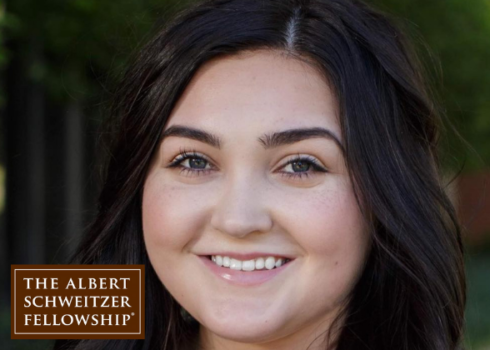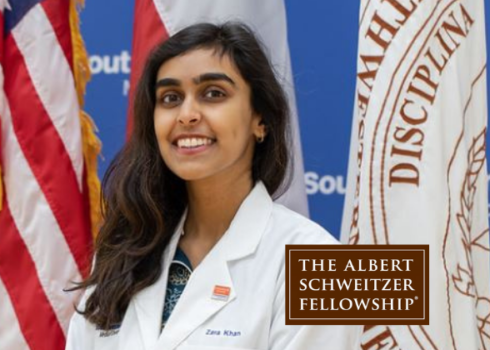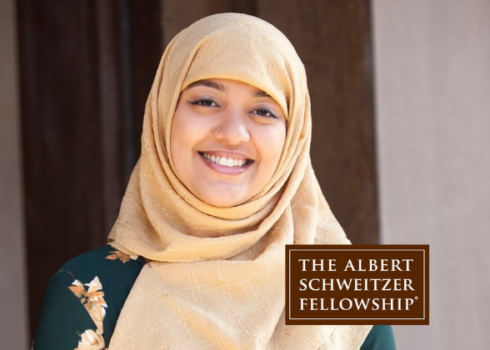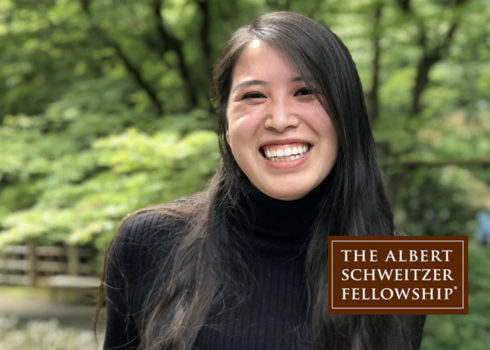Our collective mission to advance the health of the public has been fundamental to the advancement and prosperity of families in our region. In 2015, Southwestern Medical Foundation joined with the Dallas-Fort Worth Albert Schweitzer Fellowship Program (ASF) to bring the innovative service and leadership program to medical and graduate students in the Dallas-Fort Worth area. 2021 Schweizer Fellow, Shivani Raman, is using this platform to work on a project aimed at improving hypertension management.
The Schweitzer Fellowship aims to address local health disparities and the social determinants of health while developing future leaders. It was coined as a nod to the renowned physician-humanitarian and health care hero, Dr. Albert Schweitzer, who continues to inspire the legacy of community service through health care.
We had the opportunity to discuss the inspiring work of some of this year’s DFW Albert Schweitzer Fellows, who continue the spirit of Dr. Albert Schweitzer by investing in our region’s health.
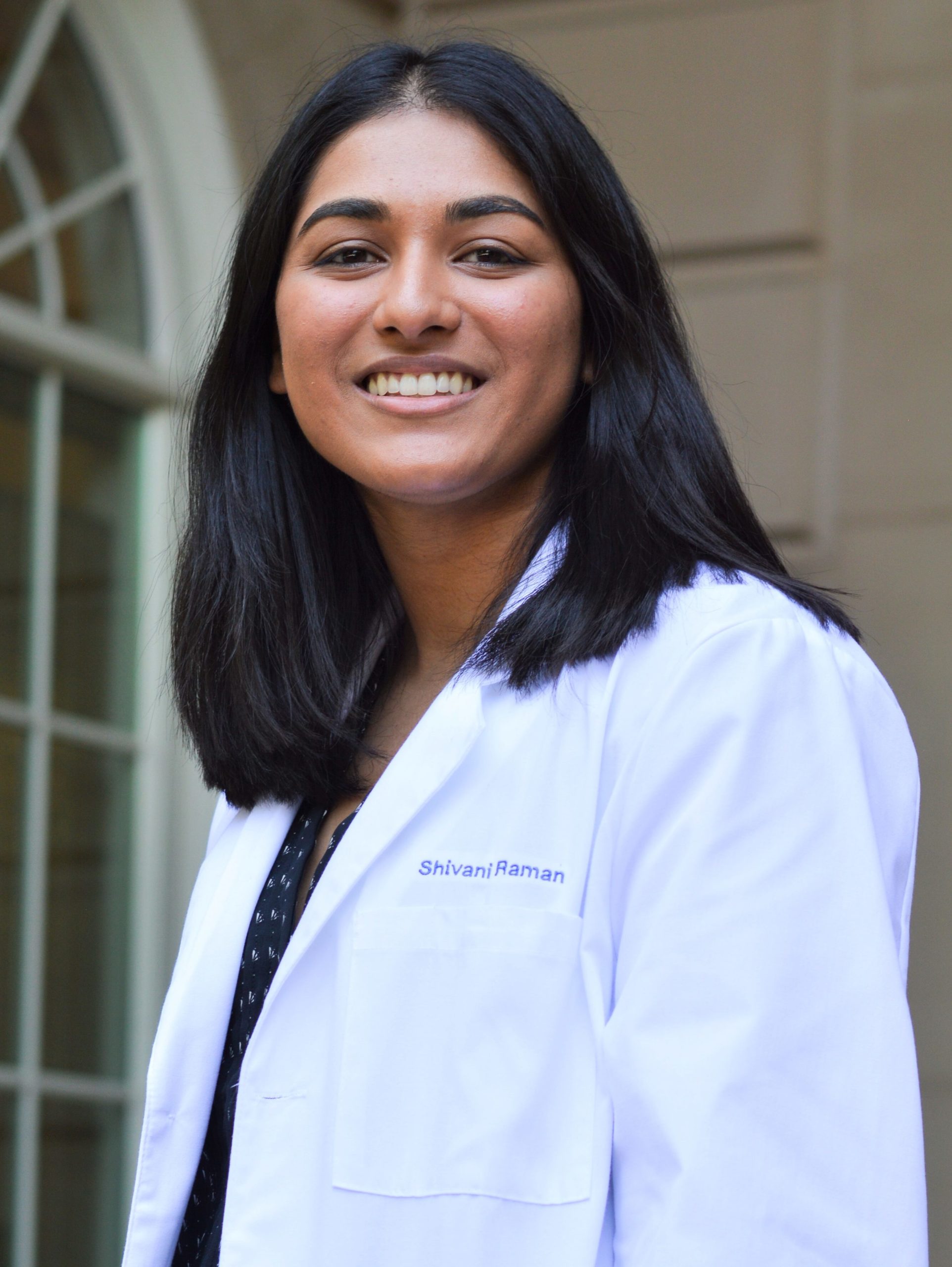
An Interview with Shivani Raman: Improving Hypertension Management
Q: Can you tell us a little bit about your background and what has led up to this moment in your career?
A: Growing up in Houston, Texas, I was exposed to significant ethnic and cultural diversity from a young age. As I grew older, however, I became more aware of the tremendous socioeconomic disparities that existed within the community. This led me to study Sociology and Poverty, Justice, and Human Capabilities at Rice University, which allowed me to explore issues I deeply care about such as systemic inequities, social justice, and pressing health challenges in the United States and globally. In line with these interests, I also spent a semester studying abroad in Chile through a program focused on public health, traditional medicine, and community empowerment, and another semester conducting research in Peru on chronic disease management in marginalized rural communities. After graduating, I took a gap year to serve as a volunteer with the non-profit organization Partners in Health in Chiapas, Mexico, where I worked with community health workers in several rural communities and gained a more in-depth understanding of community health promotion in low-resource contexts. I believe all of these experiences provided me with substantial insight into issues related to community health and major public health challenges such as chronic disease, which ultimately inspired my current Schweitzer project.
Q: How will your project improve hypertension management?
A: The goal of my project is to design and implement a self-measured blood pressure (SMBP) program for patients diagnosed with hypertension at the North Dallas Shared Ministries (NDSM) free clinic to promote improved hypertension management and patient empowerment. Hypertension is the most common condition seen in the primary care setting and the largest modifiable risk factor for cardiovascular disease. Despite the high prevalence of hypertension and its strong association with other diseases, the control of hypertension in the general population remains suboptimal. Furthermore, certain patient populations such as the one at NDSM are particularly at risk for uncontrolled hypertension due to barriers such as a lack of health insurance, time constraints, lack of transportation, language barriers, and more. My project addresses this problem by educating patients about hypertension and teaching them how to regularly check their blood pressure at home, thereby promoting improved hypertension control and empowering patients to play a more active role in their health.
Q: What does being an Albert Schweitzer Fellow mean to you?
A: To me, being an Albert Schweitzer Fellow means being able to address a major health challenge within the community while directly collaborating with patients and health providers. Throughout my fellowship year, I have had the opportunity to learn about patients’ experiences living with hypertension and listen to providers’ perspectives on helping patients manage their chronic conditions. Engaging in these conversations has allowed me and my community partner to develop a project that is tailored to the patient population and sustainable over time.
Serving as a Schweitzer Fellow has allowed me to work on an important health issue in the community, develop meaningful relationships with community members, and grow into a more effective leader.
Shivani Raman
Q: What role do you think philanthropy plays in supporting research and innovation?
A: I believe philanthropy plays an indispensable role in research and innovation by providing the necessary funds and resources to drive positive change within communities. For my Schweitzer project, an individual from the community provided a generous donation that enabled us to purchase blood pressure monitors for the patients at North Dallas Shared Ministries. Without this kind of philanthropy, it would not be possible to develop and implement new programs. Thus, I believe philanthropy is an essential part of research and innovation.
The Legacy of the Albert Schweitzer Fellowship
The philosophy behind ASF aligns with the principles the Foundation has represented since its founding. Both ASF and the Foundation were established during World War II to develop leaders in service and inspire great citizenship through philanthropy. ASF was founded by Helene Bresslau Schweitzer and Albert Schweitzer in 1940. During the same time period, Southwestern Medical Foundation instituted the Ho Din Award.
Through the Ho Din Award, the highest honor bestowed on a graduating medical student from UT Southwestern, the Foundation has supported students who exemplify knowledge, understanding, and compassion. The Fellowship Program personifies these values, instilling a life-long philosophy of compassionate patient care, and paving the way for better health for all.
The Fellowship is open to students in eight local universities, including Baylor University, Southern Methodist University, Texas Christian University, Texas Woman’s University, University of Dallas, University of Texas at Arlington, University of Texas at Dallas, and UT Southwestern Medical Center.

